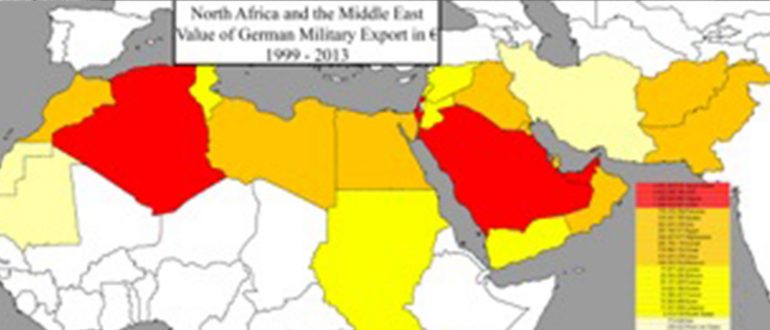Conversation within a nation – The Islamic State Dialogue
In order to legitimately engage in generation defining acts of military intervention, the British government must seek in itself, and its allies, a greater level of scrutiny. By investing in educational outreach projects, more can be done to dispel political myths, offset racial prejudice and avoid potentially career-ending public anger derived from obscure developments on the international stage.
In order to legitimately engage in generation defining acts of military intervention, the British government must seek in itself, and its allies, a greater level of scrutiny. By investing in educational outreach projects, more can be done to dispel political myths, offset racial prejudice and avoid potentially career-ending public anger derived from obscure developments on the international stage.
In light of the toxic rise of the Islamic State, more must be done by Britain to ensure that international diplomacy is subject to scrutiny from the local, regional and national consensus of moral outrage present today. In order to halt and avert the rise of the Islamic State’s ghastly ideology – wrongly claimed by Islamist radicals to be drawn from the teachings of the Qu’ran – leading Muslims must mobilise against Abu Bakr al-Baghdadi, the self-appointed Caliph, with educational resources not yet utilised by the domestic government.
Across the Atlantic, the British government can find encouragement for such plans from President Obama who has consistently encouraged his international partners to work in unison. For instance, explaining to the public that any alliance with Bashar Al-Assad to overcome the problems caused by IS rebels would be diplomatic hypocrisy seems desirable if the West plans to orchestrate morally credible campaigns.
However, for all the perceived legitimacy that well intentioned, or even principled, military retaliation can offer the leaders of the Western World, it seems that knowledge of the issues at hand is only properly disseminated with hindsight. The prospect of gaining structured advice from the very citizens that they claim to represent invariably seems to be an afterthought for policy makers. Perhaps what may serve to strengthen both a politician’s popularity and conviction would be an attempt to not just gauge public opinion but become more immersed in it – through an educational outreach series.
For all the demographic groups of a nation to truly understand the plight of moderate Muslims, being tarred with the brush of IS, bold and consistent condemnation of terrorist action must be publicised by a partnership forged between both secular and religious society. Hence, the recent news of an official fatwa levelled against the very ‘Islamic’ ideology that IS fighters cling to so perniciously must be welcomed. Progressive changes to the media’s focus on foreign policy can be achieved through greater support for social action projects. In the example of the work undertaken by the 3 Faiths Forum, supporting British university students to engage in intercultural dialogue and social intervention projects, this template should be mirrored as one which allows local discussion of international issues to be encouraged but also mediated.
Acclaimed political commentator, Medhi Hasan, has cited that the Middle East’s regional uncertainty can be likened to the conditions in which the Ottoman Empire’s last Caliph wrongly claimed precedence over all Muslims. As such, the ‘deluded’ followers of the fledgling caliphate must be countered by the reality that political Islam is not concurrent with the wishes of the Muslim world (or indeed, that of the international community as a whole).
In turn, a greater forum of debate – through external lecturers organised for schools, local community centre speakers being arranged and televised discussions being prioritised – must be seized. The outgoing coalition government must not be found guilty of avoiding their responsibilities today so that retrospective action can lazily hide their regret tomorrow.
Legitimacy in policy rests invariably on the informed complexion of the electorate. Muslims, across the globe, must feel their views are received without prejudice and readily integrated into policy solutions as part of a concerted effort to extract greater public interaction. Extensive research collated by Esposito and Dalia Mogahed goes far to substantiate the need for this improvement of people politics. Based on 50,000 interviews with Muslims in more than 35 countries, it was found that ‘majorities’ in many countries remarked that they do not want religious leaders (Muslim or otherwise) to hold direct legislative or political power. Given that this bold expression of Islamic modesty and unity stands in irreconcilable contrast to the core principle of the IS movement, more can, and should, be done to further interfaith and intercultural understanding.
Tom Bottomley
Tom Bottomley is an undergraduate student in History and Politics at the University of Nottingham.
In light of the toxic rise of the Islamic State, more must be done by Britain to ensure that international diplomacy is subject to scrutiny from the local, regional and national consensus of moral outrage present today. In order to halt and avert the rise of the Islamic State’s ghastly ideology – wrongly claimed by Islamist radicals to be drawn from the teachings of the Qu’ran – leading Muslims must mobilise against Abu Bakr al-Baghdadi, the self-appointed Caliph, with educational resources not yet utilised by the domestic government.
Across the Atlantic, the British government can find encouragement for such plans from President Obama who has consistently encouraged his international partners to work in unison. For instance, explaining to the public that any alliance with Bashar Al-Assad to overcome the problems caused by IS rebels would be diplomatic hypocrisy seems desirable if the West plans to orchestrate morally credible campaigns.
However, for all the perceived legitimacy that well intentioned, or even principled, military retaliation can offer the leaders of the Western World, it seems that knowledge of the issues at hand is only properly disseminated with hindsight. The prospect of gaining structured advice from the very citizens that they claim to represent invariably seems to be an afterthought for policy makers. Perhaps what may serve to strengthen both a politician’s popularity and conviction would be an attempt to not just gauge public opinion but become more immersed in it – through an educational outreach series.
For all the demographic groups of a nation to truly understand the plight of moderate Muslims, being tarred with the brush of IS, bold and consistent condemnation of terrorist action must be publicised by a partnership forged between both secular and religious society. Hence, the recent news of an official fatwa levelled against the very ‘Islamic’ ideology that IS fighters cling to so perniciously must be welcomed. Progressive changes to the media’s focus on foreign policy can be achieved through greater support for social action projects. In the example of the work undertaken by the 3 Faiths Forum, supporting British university students to engage in intercultural dialogue and social intervention projects, this template should be mirrored as one which allows local discussion of international issues to be encouraged but also mediated.
Acclaimed political commentator, Medhi Hasan, has cited that the Middle East’s regional uncertainty can be likened to the conditions in which the Ottoman Empire’s last Caliph wrongly claimed precedence over all Muslims. As such, the ‘deluded’ followers of the fledgling caliphate must be countered by the reality that political Islam is not concurrent with the wishes of the Muslim world (or indeed, that of the international community as a whole).
In turn, a greater forum of debate – through external lecturers organised for schools, local community centre speakers being arranged and televised discussions being prioritised – must be seized. The outgoing coalition government must not be found guilty of avoiding their responsibilities today so that retrospective action can lazily hide their regret tomorrow.
Legitimacy in policy rests invariably on the informed complexion of the electorate. Muslims, across the globe, must feel their views are received without prejudice and readily integrated into policy solutions as part of a concerted effort to extract greater public interaction. Extensive research collated by Esposito and Dalia Mogahed goes far to substantiate the need for this improvement of people politics. Based on 50,000 interviews with Muslims in more than 35 countries, it was found that ‘majorities’ in many countries remarked that they do not want religious leaders (Muslim or otherwise) to hold direct legislative or political power. Given that this bold expression of Islamic modesty and unity stands in irreconcilable contrast to the core principle of the IS movement, more can, and should, be done to further interfaith and intercultural understanding.
Tom Bottomley
Tom Bottomley is an undergraduate student in History and Politics at the University of Nottingham.



